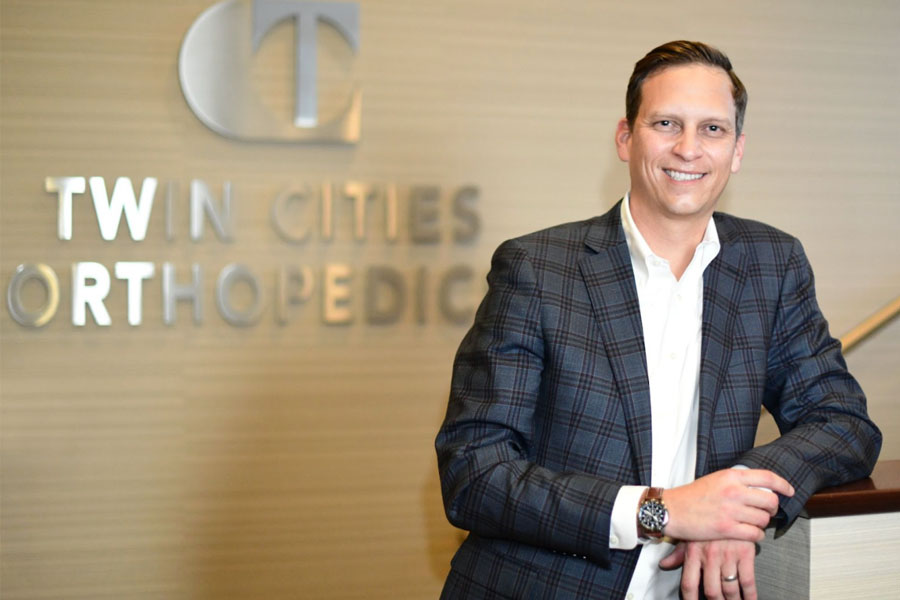What is your current role in health care?
“I am the CEO for Twin Cities Orthopedics. Prior to that, I was Chief Operating Officer at TCO for about eight years. Currently I am tasked with leading our senior leadership team, executing our strategic plan, and helping to formulate that plan in conjunction with the Board of Directors and Executive Committee.
What stands out as a favorite memory during your time as an MHA student?
“What I recall most fondly are the bonds with my classmates. We had a small class, only 18 students, and it was the year that the MHA program was transitioning from the Carlson School of Management to the School of Public Health. We were a tight knit group and spent a lot of late nights studying and preparing for presentations or exams. Because of our size we built some pretty strong relationships with one another.
I met my wife there too, so that is obviously a great memory of mine and of ours, going through the program together, graduating at the same time, and just getting to know one another while we were in grad school.”
How has the MHA Program helped prepare you for your career?
“First and foremost, it taught me how to think critically and work in teams. I was a biology major in undergrad so I didn’t have much team-based work experience. It was a change to work in small groups and team settings but the experience became invaluable as I progressed in my career and tackled complex healthcare problems. Teamwork is something the Minnesota MHA program does very well.”
What challenges and opportunities will healthcare leaders encounter in the next 5-15 years? What skills will leaders need to be successful in light of these challenges and opportunities?
“Obviously, COVID has been a challenge in and of itself but I would say that we will continue to see more and more consolidation of hospitals and health systems. More physicians are moving into an employed model but clearly, with my role, I’m rather the antithesis as the CEO of an independent physician practice. The reason we are one of the few remaining independent practices in this market is because of our size. If you’re going to survive with some of the challenges we face in health care, you have to be big and have the infrastructure in place to deal with the challenges.
Another challenge is that healthcare consumers are more educated now than ever, rightfully so just with the cost of health care. One thing that we promote at TCO is a focus on value based care – improving quality, decreasing costs, and improving the patient experience. That requires work with a lot of different stakeholders to execute the vision and drive value. You have to be able to work with providers, who think differently than administrators.
To succeed, leaders must be innovative and think differently. The traditional ways of delivering health care no longer works. You have to be able to work with cross functional teams. I wear my administrative cap but I work with surgeons, physician assistants, nurse practitioners, nurses, and athletic trainers, Everyone brings a different perspective and skill set to the table and you have to leverage those to tackle complex programs. Teamwork is critically important for future healthcare leaders.”
If you could give one piece of advice to a current student, what would it be?
“Ask a lot of questions, inside and outside the classroom.
The Minnesota MHA program has strong networking opportunities. I’m always running into people who went to the Minnesota program. We have a connection that typically opens doors. Overall, I would say network as much as you possibly can during your time there, and even beyond as well.”
Why is your class the best class ever?
“For me, it’s because I got to meet my wife and start a family. As a result, had I not gone to the Minnesota MHA program, who knows where I’d be not only professionally but certainly personally as well.”

